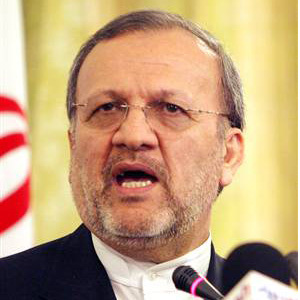Resignation and Rumor; Mottaki in the Last Iranian Year
An overview of Manouchehr Mottaki’s remarks and measures in the last Iranian Year

Manouchehr Mottaki, the Iranian Foreign Minister, can be one of the persons of the year among the group that handle Iran’s foreign affairs. After three years of administration in Ministry of Foreign Affairs, still Mottaki has not managed to act as a minister that has his own professional style or power to influence the procedures.
His remarks and measures last Iranian year revealed that despite his diplomatic background and familiarity with current trend of Iran’s diplomatic body, he has not been successful in fulfilling the responsibilities of the highest-ranking diplomat of Iran.
Mottaki was born in Bandar-e-Gaz in 1953. Two years before the Islamic Revolution he achieved his B.A. from the University of Bangalore in India. A decade after the revolution and in the early years of 1990s he achieved his M.A. in international affairs from the University of Tehran.
Before becoming foreign minister in Ahmadinejhad’s administration, Mottaki was a member of foreign affairs committee of the first parliament after the revolution, head of the 7th political office of Ministry of Foreign Affairs, Iranian ambassador to Turkey and Japan, Director General of West Europe department of Ministry of Foreign Affairs and Advisor to Foreign Minister. Despite leading the electoral campaign of one of Ahmadinejhad’s opponents (Ali Larijani) during 2005 presidential elections, he was appointed by the President as the Foreign Minister.
He is one of the rare officials of the foreign ministry that has held various posts in the parliament and accordingly has a good base among M.P.s. But despite his background he hasn’t managed to build-up an image of himself as a veteran diplomat for the public opinion and his extraordinary remarks about touchy issues of foreign diplomacy have caused great surprise.
Mottaki uttered one of these controversial remarks meeting press and rejecting the previous statements of Iranian officials that Iran possessed a 50% share of the Caspian Sea. For the first time the top official of the Ministry of Foreign Affairs announced that Iran’s share of this lake is 11%. The comment astounded many of the officials and Caspian Sea experts, but at the same time it was welcomed by other littoral states and bolstered the idea that Iran has revised its Caspian policy and consented to the share proposed by its northern neighbors. It also caused trouble for Ahmadinejhad’s government and sparked off debates about the maximum and minimum of Iran’s share of the Caspian Sea, 50% percent as the maximum and 11.3% as the minimum.
After the reactions, The National Security Committee of the parliament summoned Mottaki for explanations. One of the members of the committee said that Mottaki had denied the statements; however, he disregarded the committee’s request to make an official statement in the media.
Reminding that since 1921 no treaty that rejects Iran’s supposed share of the Caspian Sea has been contracted, this member of the National Security and Foreign Affairs Committee stated that Iran’s share of the sea must be still 50%, since the territorial integrity of our country has not changed.
Mottaki was summoned another time after arranged Ahmadinejhad’s attendance in the Cooperation Council for the Arab States of the Gulf. The Iranian president joined the summit without protesting the use of the forged term "Arabian Gulf". According to the protocols, the Ministry of Foreign Affairs had to set the prearrangements for use of the genuine name of Persian Gulf. Attendance of the Iranian President became one of the most controversial news of Iran’s diplomatic body last year and led the M.P.s to consider his impeachment.
Apart from other controversial news such as rumors about Mottaki’s apology from Bahrain after an anti-Bahrain article was published in Keyhan Newspaper, his joint panel with Zalmay Khalilzad in Davos, appointment of his wife as Director General of Women Affairs Department of the Ministry, released of a forged atlas by the Republic of Azerbaijan and vacant seat of ambassadors to countries such as Portugal (that held the presidency of European Union in 2007), the news around his resignation was another controversial topic of Iran’s foreign diplomacy within the last year.
Although rumors around the likely resignation of Mottaki had been spread by media, statements of two members of the parliament claiming that Iran’s foreign minister has delivered his letter of resignation to Ahmadinejhad fueled these rumors. Of course these members quickly denied their statements, but since the news had spread one week after the resignation of Ali Larijani, a close friend of Mottaki, from the Supreme Council of National Security, in one of press meetings the Foreign Minister had to deny the news of his resignation and said that he has got no time to pay attention to such rumors.
By: Ali Attaran

